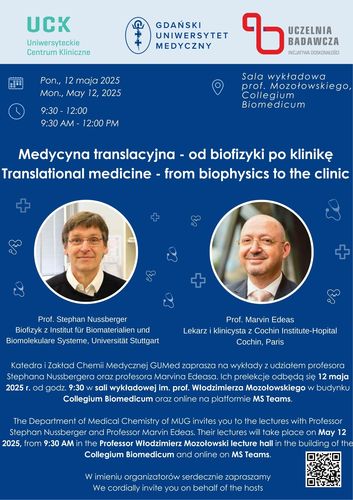"Translational medicine – from biophysics to the clinic" – expert lectures
5.05.2025
The scientific meeting, entitled Translational Medicine – from biophysics to the clinic, will be held on May 12 at 9:30 a.m. in the Prof. Włodzimierz Mozołowski Lacture Hall in the building of the Collegium Biomedicum and on-line on the Teams platform. Speeches will be given by foreign experts Prof. Stephan Nussberger of the Institut für Biomaterialien und Biomolekulare Systeme, Universität Stuttgart and Prof. Marvin Edeas, MD, a clinician at the Cochin Institute – Cochin Hospital in Paris. The meeting is organized by the Department of Medicinal Chemistry at MUG. The event is aimed at both students and employees of MUG.
AGENDA
- 9:30-10:30 Profesor Marvin Edeas
Title: Dialogues Between Two Ancient Allies: Mitochondria and Gut Microbiota in Health and Disease/Tytuł: Dialogi między dwoma starożytnymi sojusznikami: mitochondria i mikrobiota jelitowa w zdrowiu i chorobie
- 10:45 -11:45 Profesor Stephan Nussberger
Title: Modulating cell membranes using DNA origami nanorobots/ Tytuł: Modulacja błon komórkowych za pomocą nanorobotów DNA origami
SPEAKERS
Profesor Stephan Nussberger is a specialist in biophysics and biochemistry, with special interests in protein translocation into mitochondria via diffusion, protein import channels and mitochondrial outer membrane translocase (TOM). Mitochondrial dysfunction underlies numerous diseases, and mitochondria themselves are often the target of anti-cancer therapies, therefore understanding their function is important for students, researchers and clinicians. In this seminar, Prof. Stephan Nussberger will present breakthroughs in synthetic biology based on DNA nanotechnology. He will present recent pioneering work on DNA origami nanorobots – developed in collaboration with Prof. Laura Na Liu, Dr. Sisi Fan (Institute of Physics), Dr. Shuo Wang (Department of Biophysics) and their research teams – which enable precise manipulation of synthetic cell membranes. The research is focused on creating synthetic, dynamic, signal-responsive membrane channels for targeted delivery of therapeutic proteins to individual cells. Prof. Nussberger will demonstrate how DNA nanorobots can alter membrane morphology and create functional synthetic channels, opening up exciting new possibilities for delivery of medications, biosensors, and biological cell engineering.
Profesorem Marvin Edeas – MD, clinician. He currently works at the Cochin Institute – Cochin Hospital. Professor Marvin conducts research in internal medicine and infectious diseases focusing on the impact of microbiota diversity and its influence on the onset of diseases. Some of the research also looks at how the microbiota communicates with organs and modulates numerous functions. The professor’s team’s research addresses the role of olfactory receptors in this process. The professor’s lecture will focus on mitochondria and the intestinal microbiota, two evolutionary systems engaged in an ongoing and complex dialogue that affects energy metabolism, immune responses and overall human health. This lecture will discuss the emerging concept of the mitochondria-microbiota axis, with a detailed description of how microbial metabolites affect mitochondrial function and how mitochondria in turn shape microbial ecosystems. The implications of this bidirectional communication in diseases such as neurodegeneration, metabolic syndrome and cancer will also be discussed, and new therapeutic avenues for the correlation of microbiology, cell biology and medicine will be highlighted.
